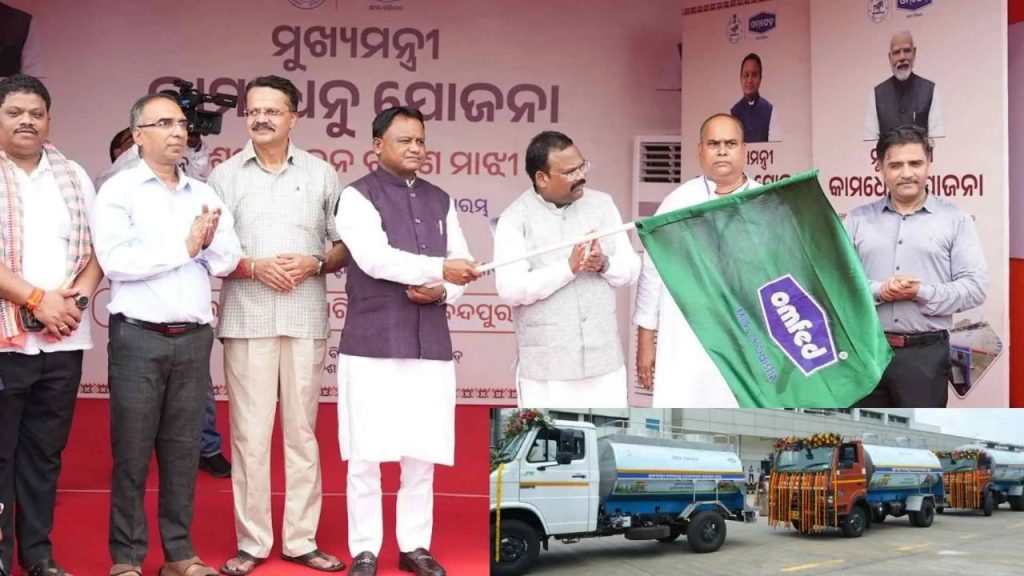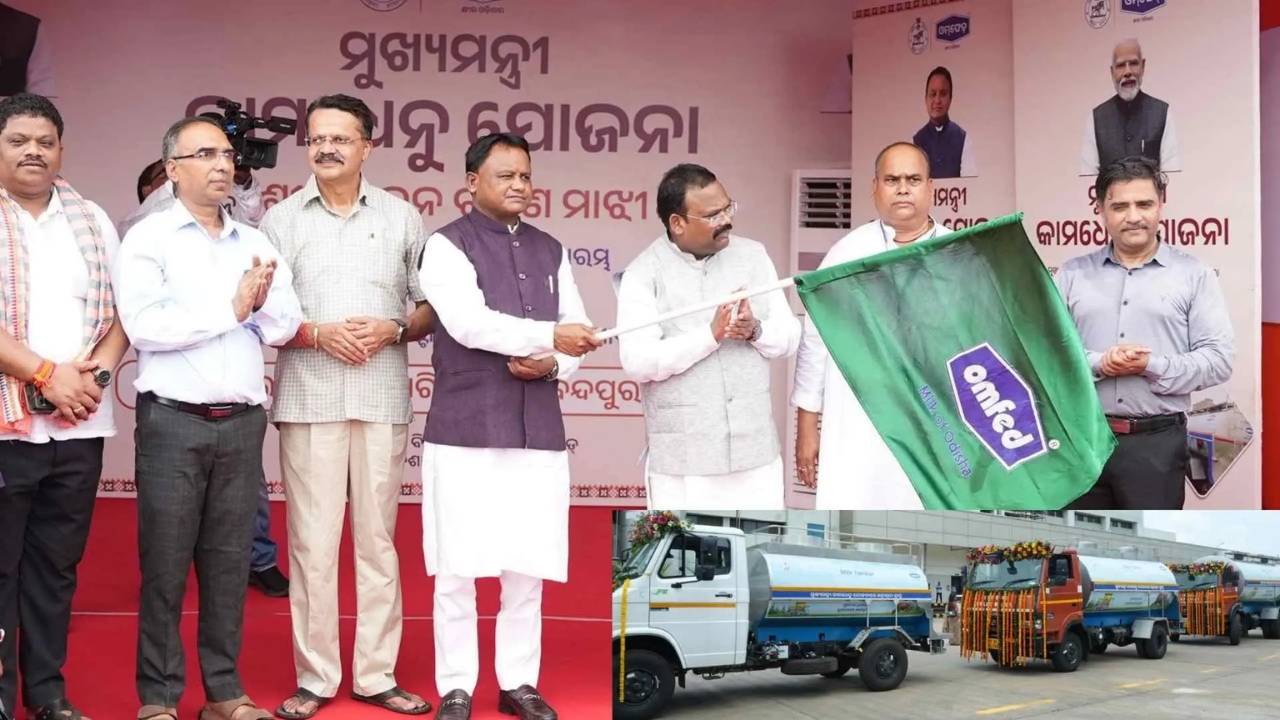In a significant move aimed at transforming the dairy sector, Chief Minister Mohan Charan Majhi of Odisha announced a landmark partnership between the Odisha State Cooperative Milk Producers’ Federation (OMFED) and the National Dairy Development Board (NDDB). This collaboration is set to empower over 15 lakh dairy farmers across the state, marking a new chapter in Odisha’s agricultural and dairy landscape.
This agreement not only promises economic benefits for the state’s farmers but also represents a strategic push toward enhancing milk production, improving sustainability, and boosting the income of local dairy farmers. The OMFED-NDDB pact outlines several ambitious goals, including increasing milk production to meet growing demand, improving the livelihoods of farmers, and introducing eco-friendly initiatives such as biogas plants.

In this article, we will explore the key highlights of this agreement, how it will benefit both dairy farmers and the state’s economy, and what it means for the future of Odisha’s dairy industry. We will also provide insights on the steps involved in implementing these initiatives and how they could serve as a model for other states in India.
OMFED-NDDB Agreement to Benefit 15 Lakh Dairy Farmers in Odisha
| Key Aspect | Details |
|---|---|
| Target Beneficiaries | 15 Lakh dairy farmers across Odisha |
| High-Yielding Cattle | Supply of 4,000 high-yielding cows of Gir, Sahiwal, and cross-breeds |
| Biogas Plants | Establishment of cow dung-based biogas plants to generate cooking gas and organic fertilizer |
| Milk Storage & Packaging | 22 milk storage tanks (2,000 to 15,000 liters) and 3 advanced milk packaging machines worth ₹3.5 crore |
| Dairy Products Expansion | Ramp-up in production of paneer, butter, chhena poda, ice cream, and other value-added dairy products |
| Milk Production Targets | Increase from 72 lakh liters/day to 165 lakh liters/day by 2036, and 274 lakh liters/day by 2047 |
| Financial Assistance to Farmers | 70% assistance under the Chief Minister Kamadhenu Yojana |
| Accidental Death Compensation | ₹1 lakh compensation for families of OMFED-affiliated farmers |
| Official Website | OMFED Official Website |
The OMFED-NDDB agreement marks a game-changing moment for the dairy industry in Odisha. With an ambitious roadmap that includes the introduction of high-yielding cattle, the establishment of biogas plants, and improvements in milk storage and packaging, this collaboration will significantly enhance the livelihoods of 15 lakh dairy farmers. By increasing milk production, promoting sustainability, and diversifying dairy products, Odisha’s dairy sector is poised for remarkable growth.
This partnership not only benefits farmers but also contributes to the broader goal of sustainable development and economic prosperity. It’s an excellent example of how public-private partnerships can drive innovation and progress in rural India.
Understanding the OMFED-NDDB Agreement
The Foundation of the Agreement
The OMFED-NDDB partnership is a robust collaboration designed to revolutionize the dairy industry in Odisha. OMFED, which has long served as the backbone of Odisha’s dairy cooperative movement, will now partner with NDDB, a government body with a rich history of working in the dairy sector to provide technical, financial, and logistical support.
The core goal of this collaboration is to enhance milk production in Odisha, a state that produces 72 lakh liters of milk per day. Through this partnership, the state aims to double this number to 165 lakh liters by 2036, and a further increase to 274 lakh liters by 2047.

Practical Impact: How the Agreement Benefits Farmers
The primary beneficiaries of this agreement will be the 15 lakh dairy farmers across Odisha. This initiative promises several benefits, both immediate and long-term:
1. Access to High-Yielding Cattle
The agreement will introduce around 4,000 high-yielding cows from NDDB, which are renowned for their superior milk production. These cows belong to Gir, Sahiwal, and other cross-breed varieties, which are known for their high milk output. For dairy farmers, this means more milk per cow, resulting in increased income from their dairy operations.
2. Sustainability through Biogas Plants
A standout feature of this agreement is the biogas plants that will be set up across the state. Cow dung-based biogas plants will not only provide cooking gas for the farmers but will also generate organic fertilizers, reducing dependence on chemical fertilizers. This is a win-win for farmers as it provides an alternative energy source and contributes to the sustainability of farming practices.
3. State-of-the-Art Milk Storage and Packaging
One of the key objectives of the agreement is to improve milk storage and packaging infrastructure. A total of 22 milk storage tanks will be installed with capacities ranging from 2,000 to 15,000 liters, significantly boosting the storage capabilities of OMFED and ensuring that the milk collected is fresh and preserved properly. Additionally, the installation of advanced milk packaging machines worth ₹3.5 crore will streamline the packaging process, ensuring that dairy products meet modern standards and consumer preferences.
4. Expansion of Dairy Product Production
OMFED also plans to diversify its range of dairy products. With a focus on producing value-added dairy products, such as paneer, butter, chhena poda, ice cream, and even regional favorites like mishti doi, this initiative will create new income streams for local farmers, especially the youth. This expansion of product lines could lead to the creation of new jobs in packaging, marketing, and retail.
5. Financial Assistance and Insurance for Farmers
The Odisha government has also pledged its support through the Chief Minister Kamadhenu Yojana, which provides up to 70% financial assistance for dairy farmers to help them acquire cattle and improve their operations. This is an essential step in helping farmers scale their businesses and improve productivity. In addition, the government has announced a ₹1 lakh accidental death compensation for families of OMFED-affiliated farmers, offering an added layer of financial security.
Steps Toward Implementing the Agreement
1. Setting Up the Infrastructure
The first step in implementing the agreement will be the establishment of biogas plants, storage tanks, and the installation of advanced milk packaging machines. These elements will require careful coordination between OMFED and NDDB to ensure that the infrastructure is built to high standards and that farmers are trained in its proper usage.
2. Training and Support for Farmers
Dairy farmers will receive comprehensive training on how to care for the new high-yielding cows, the benefits of sustainable farming, and how to use the biogas plants. This will include guidance on best practices for milk collection, cleanliness, and hygiene, ensuring that they meet the required standards for both local and national markets.
3. Monitoring and Evaluation
To ensure the success of this agreement, regular monitoring will be carried out to track progress. OMFED and NDDB will work closely with local authorities to ensure that farmers receive continuous support and that challenges are addressed promptly. Data on milk production, cattle health, and financial assistance will be regularly reviewed.
Man Consumes Poison After Police Inaction in Daughter’s Abduction Case in Odisha
Odisha Crime Branch Interrogates Person Who Tried to Prevent Self-Immolator’s Death
FAQs
Q1: How will the high-yielding cows benefit dairy farmers?
The introduction of high-yielding cows will significantly increase the amount of milk produced per cow, leading to higher profits for dairy farmers. These cows are selected for their ability to produce more milk with less effort, making dairy farming more profitable and sustainable.
Q2: What is the role of biogas plants in this agreement?
Biogas plants will help farmers convert cow dung into cooking gas and organic fertilizers, reducing their reliance on traditional energy sources and chemical fertilizers. This is an eco-friendly solution that promotes sustainability in farming.
Q3: How does the Kamadhenu Yojana help dairy farmers?
The Kamadhenu Yojana offers financial assistance to dairy farmers, covering up to 70% of the cost of purchasing cattle. This makes it easier for farmers to scale their businesses and improve their productivity without bearing the full financial burden.





